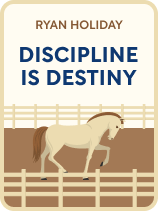

This article is an excerpt from the Shortform book guide to "Discipline Is Destiny" by Ryan Holiday. Shortform has the world's best summaries and analyses of books you should be reading.
Like this article? Sign up for a free trial here.
How does your appearance affect your mindset? What does Ryan Holiday consider to be a superpower?
Discipline is the ability to restrain your baser urges in pursuit of what’s best for you. By reading Ryan Holiday’s Discipline Is Destiny, you can better understand how to take control of yourself and resist temptations.
Below we’ll look at three Discipline Is Destiny quotes to get the main ideas.
Discipline Is Destiny Quotes
In Discipline Is Destiny, Ryan Holiday examines the power of discipline through the lens of the ancient Greek philosophy of Stoicism. Holiday argues that your ability to practice discipline—one of the four cardinal virtues of Stoicism—determines how successful you are (aka your destiny). This is because discipline dictates whether you work consistently and avoid the temptations that prevent you from attaining or maintaining success.
Holiday is a modern-day Stoic philosopher who’s written or co-written several best-selling books on Stoicism, including The Obstacle Is the Way, Ego Is the Enemy, and The Daily Stoic. Published in 2022, Discipline Is Destiny is the second book in his four-part series highlighting each of the four cardinal virtues of Stoicism. (Courage Is Calling was the first.)
Here are three Discipline Is Destiny quotes with descriptions that encapsulate Holiday’s book.
“In a world of distraction, focusing is a superpower.”
Holiday asserts that taking care of your body ensures you’re healthy enough to pursue your purpose. So eat a healthy diet, exercise regularly, and rest adequately. Eating well supports your health and lets you practice resisting temptation. Exercising regularly and pushing through physical challenges fortifies your ability to push through mental challenges. Getting enough rest provides your body with a chance to restore itself; working excessively to the point of ignoring your body’s needs is not discipline and will likely backfire eventually. And sleeping well improves your ability to make hard decisions.
(Shortform note: In High Performance Habits, Brendon Burchard agrees that maintaining your health is essential to pursuing your purpose. But while Holiday speaks of maintaining your health in general, Burchard argues that different habits support different areas of health—physical, mental, and emotional—and thus provide different benefits. Eating well, exercising regularly, and getting adequate rest improve your physical health and as such give you energy and mental clarity, and release brain chemicals that help with emotional management. Good mental health enables you to pace yourself, which helps you stay on-task, while good emotional health helps you relate to others and effectively handle stress.)
Holiday also recommends that you straighten up your workspace and your appearance—both of which also set the stage for you to tackle your purpose. He argues that organizing your workspace frees up the mental energy you need to focus on your purpose and reduces the feeling of overwhelm from the massive amounts of information you encounter in your daily life—whether in emails or physical clutter. (Shortform note: Having an organized workspace may not improve your ability to work if your problem is not that you’re overwhelmed or tired but that you can’t be creative. Some studies suggest that being in a messy environment improves creativity.)
Similarly, straightening up your appearance puts you in a better mindset to work than being unkempt. Moreover, your appearance affects how positively others perceive you and whether they want to work with you. While excessively focusing on fashion is undesirable, dressing well may allow you to connect with people who are essential to your work.
(Shortform note: Scientists agree that your clothing affects your self-perception, which changes how you work—a theory known as “enclothed cognition.” Notably, it’s not just what you wear, but how you perceive what you wear that affects how you see yourself and how you work. In the 2012 study that introduced the term enclothed cognition, students were recruited to wear white lab coats. The students who were told that these were “medical doctor’s coats” were more able to sustain their attention than those who were told that they were “artistic painter’s coats.” This indicates that it was the value the students assigned to the lab coats—not the lab coats themselves—that affected the students’ focus.)
“As they say, another way to spell “perfectionism” is p-a-r-a-l-y-s-i-s.”
Holiday asserts that dealing with failure in a disciplined manner requires that you learn to handle it with grace. In general, don’t treat failure as an excuse to stop; remain persistent and pursue your goals despite the failure. Also, show yourself compassion: Instead of bombarding yourself with negative self-talk when you fail, talk to yourself as you would a friend. That said, don’t prioritize persistence above all else. Pushing forward is virtuous, but if you’re unable to admit that you need to stop because you’re not doing well, you’ll keep going even when you shouldn’t—and ultimately encounter an even more agonizing defeat.
“The less you desire, the richer you are, the freer you are, the more powerful you are.”
Holiday suggests a way to practice discipline is by learning how to handle power. Contrary to popular opinion, gaining power doesn’t give you extra perks; rather, power is the perk. Therefore, you ought to do more than the people below you—not less, as most are wont to do. For example, when former Defense Secretary (and then-Brigadier General) James Mattis encountered a soldier performing guard duty on Christmas Day, he sent the soldier home to enjoy the holiday and worked guard duty himself—instead of deciding that his holiday off was a perk of power.
(Shortform note: Holiday’s perspective on power aligns with that of Simon Sinek. In Leaders Eat Last, Sinek argues that if you’re a leader, your primary responsibility is to prioritize your subordinates’ needs above your own. By doing so, you prove that you see them as people—not as assets you can use. As a result, your subordinates feel as though you support them, which makes them feel safe and thus more willing to collaborate and take the risks necessary for success. Mattis made his soldiers feel that way both through his actions (like working guard duty on Christmas) and through his words: One soldier praised Mattis for giving a relatable speech during wartime, saying, “Mattis spoke like an enlisted man. He spoke to the enlisted man.”)
Additionally, you must learn to give up power. The most self-disciplined people have control over themselves; as a result, they don’t desire control over others. Moreover, they understand that having too much power often leads to self-destruction—and so they’re willing to give it up.
(Shortform note: In David and Goliath, Malcolm Gladwell proposes that having too much power leads to destruction: When you have power, you forget that you only have as much power as your subjects are willing to give you. If you take an action that your subjects deem unfair or unpredictable, or that makes them feel voiceless, they view your power as illegitimate and grow defiant—which weakens your power and may lead to your destruction.)

———End of Preview———
Like what you just read? Read the rest of the world's best book summary and analysis of Ryan Holiday's "Discipline Is Destiny" at Shortform.
Here's what you'll find in our full Discipline Is Destiny summary:
- Why your ability to practice discipline determines how successful you are
- How to practice discipline throughout various stages of your life
- Why the greatest enemy to discipline is your ego






